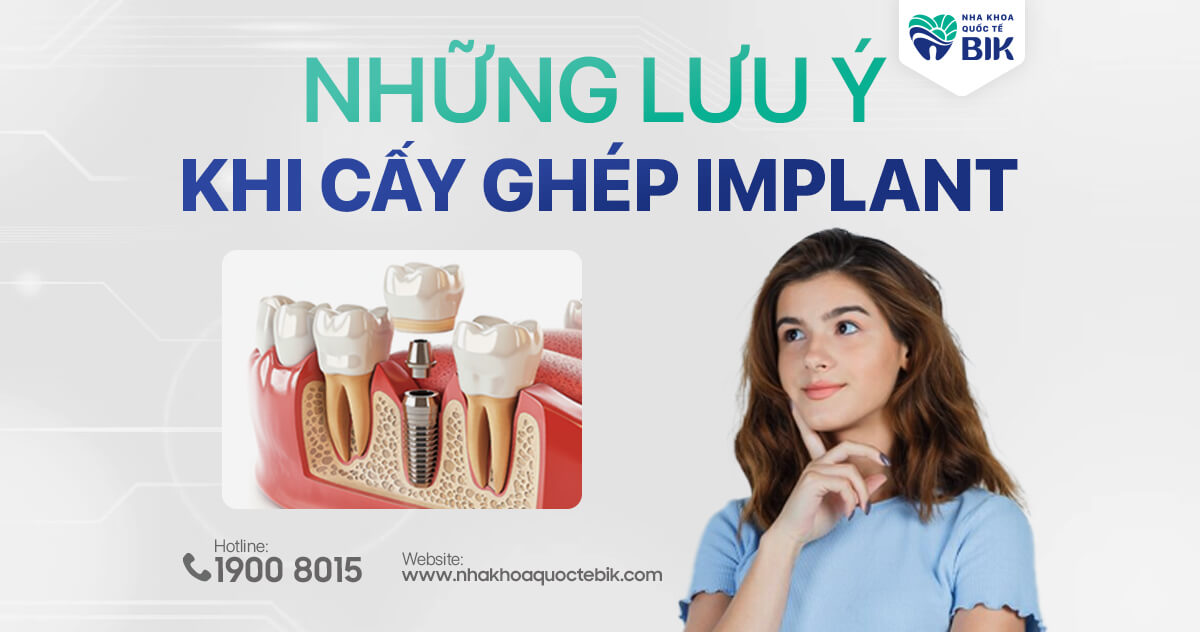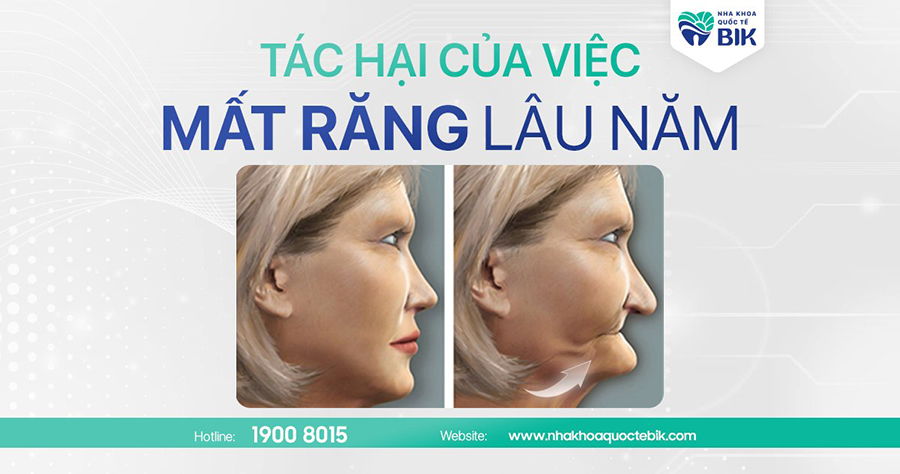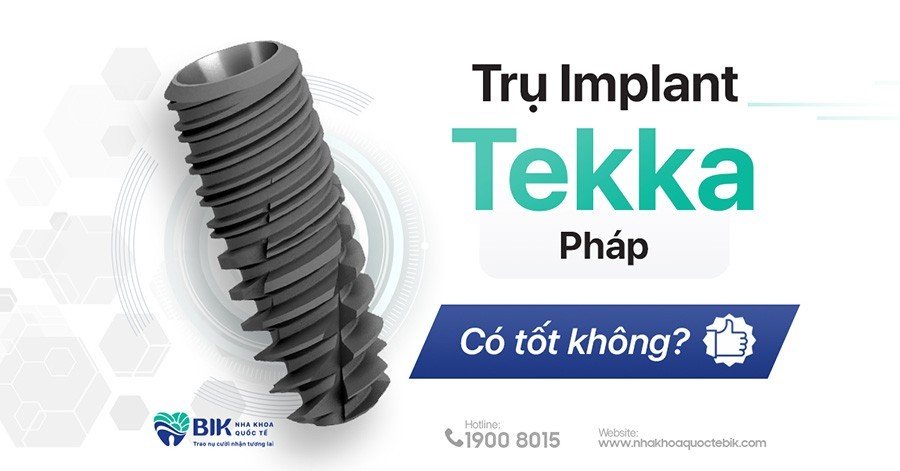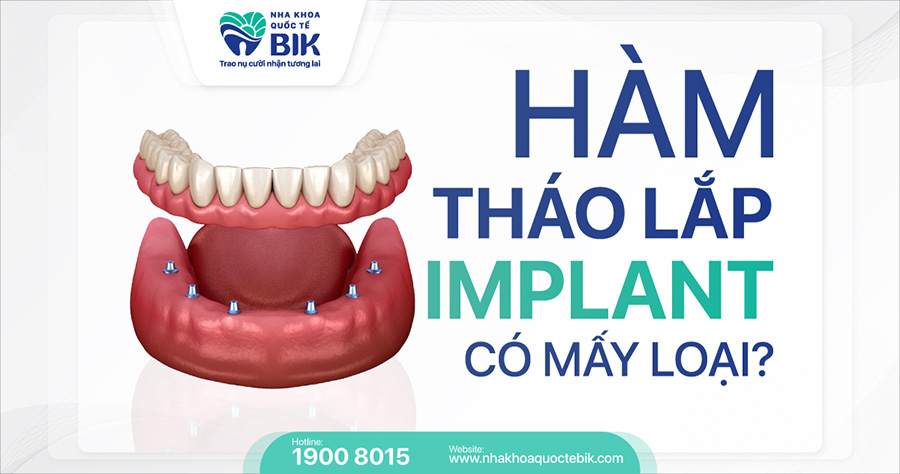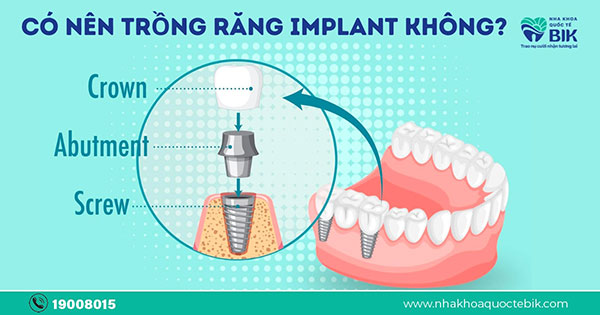Millions of people lose teeth due to diseases such as tooth decay, periodontitis or trauma. This leads to conditions such as difficulty in chewing, pronunciation, loss of confidence in communication… Implantation is considered a solution that can overcome the above problems with long-term effectiveness.
1. What is an implant?

Implant is essentially a small screw made of Titanium that is the size of a real tooth root. Because it is made from high-quality Titanium material, the Implant is biocompatible with bone, completely benign and safe for the body.
2. What is Implant?
Implant is a very popular restoration method in our country today. With this method, the missing real tooth will be replaced with a fake tooth made of 3 main parts: Implant pillar, Abutment joint and Porcelain crown.
When implanting teeth, the Implant pillar will act as an artificial tooth root firmly inserted into the jaw bone. The Implant pillar has the function of supporting the porcelain crown attached above through the Abutment joint.
3. Advantages of dental implants

Here are the advantages of dental implants that you should know:
3.1. Prevent bone loss and gum recession
The dental implant method can completely prevent bone loss and gum recession due to long-term tooth loss because the implant acts as a real tooth root.
3.2. Improve aesthetics
The implant tooth will have the same structure as a real tooth, from shape, size to color. It will be difficult to distinguish the implant tooth from a real tooth if you only look from the outside, so you do not need to worry about aesthetics when performing an implant.
3.3. Restoring tooth function
Because it has the same structure as a real tooth, the implant tooth will also have the chewing function and feel like a real tooth. You will be completely comfortable eating and drinking without having to abstain from tough or hard foods.
3.4. Long life span
The implant is implanted into the jaw bone, so it has very good durability. If properly cared for, the lifespan of the Implant can last a lifetime because the Titanium material has a very high biocompatibility with the body.
3.5. Independent existence
The Implant exists independently, so when implanted, it only affects the position of the missing tooth, not affecting other teeth, so the surrounding teeth will be kept intact.
4. Disadvantages of dental implants
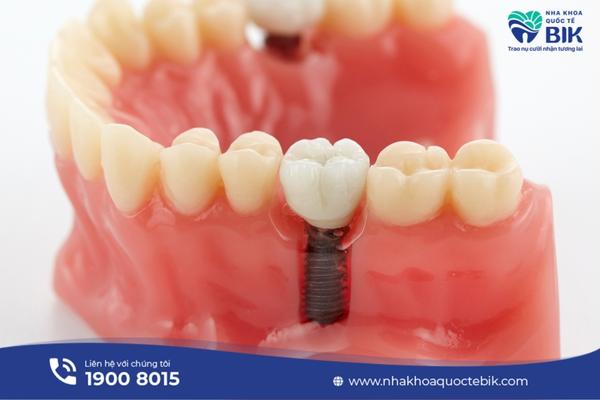
In addition to the outstanding advantages, there are also disadvantages of dental implants as follows:
4.1. High cost
Compared to all other tooth restoration methods, dental implants have the highest cost, ranging from 18-35 million VND/tooth depending on the type of implant.
4.2. Not suitable for everyone
Not all cases of tooth loss can be implanted, you must meet a number of conditions to proceed with the implant. In addition, children under 18 years old should not have implants because the jawbone has not fully developed and stabilized.
4.3. Takes a long time to treat
Implantation is a rather complicated restoration method, so the treatment time is quite long. Many cases can be completed in a few days or up to 6 months. After implantation, there will be an additional period of time to monitor the stability of the implant.
5. What are the conditions for implantation?
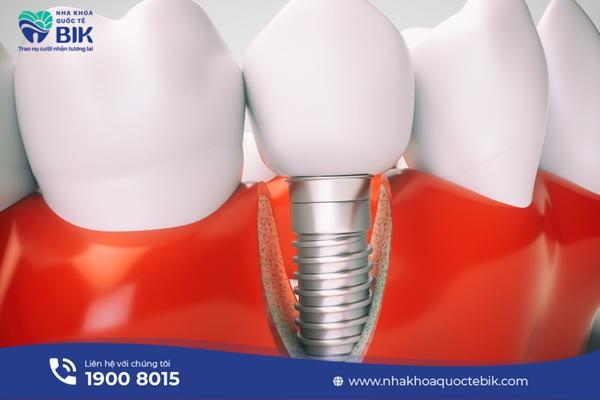
Not everyone can have dental implants, so you must meet the following conditions:
5.1. Age
Only perform dental implants when you are 18 years old because at this time the jawbone system has fully developed and is stable. If you still perform implants in younger cases, it will affect the jawbone development process, causing unnecessary deviations.
5.2. Good health
In case of poor health or chronic diseases such as diabetes or cardiovascular disease, the severity must be considered to assess the success of the implant surgery. If the case of implant surgery is not safe, the doctor will prescribe other methods of implanting dentures.
5.3. The jaw bone surface meets the standards
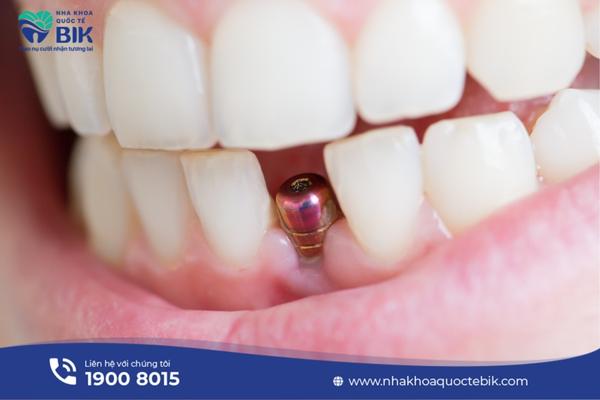
Because the implant is attached directly to the jaw bone, it requires the jaw bone to be rigid, the volume must ensure enough height and thickness to be able to implant teeth. In cases of long-term tooth loss leading to jawbone loss, the doctor will prescribe bone grafting to meet the conditions for dental implant placement.
5.4. Do not use stimulants
If you use stimulants such as beer, alcohol, cigarettes, etc., you can still have an implant. However, you should stop using them at least 1 month before and after the implant to ensure that the implant is not rejected from the body.
6. Implantation procedure
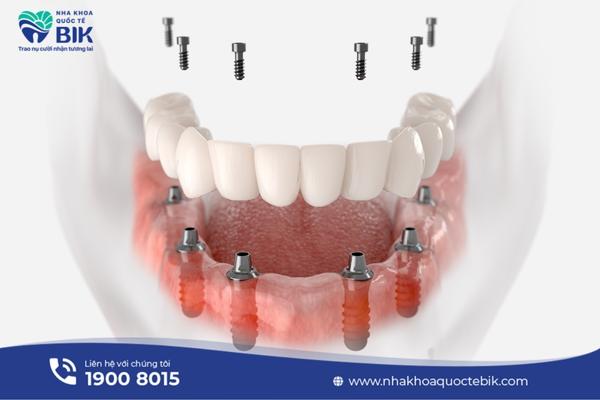
6.1. General examination
The doctor will examine the oral condition to see if there are other diseases. You will have to completely treat oral diseases such as periodontitis, tooth decay, etc. before proceeding with the implantation
6.2. CT scan and consultation
The doctor will perform a CT scan to check the height, width and porosity of the jawbone. From the results, the doctor will plan the treatment and choose the appropriate implant size. In addition, the doctor will also advise whether you need to perform bone grafting before implant placement?
6.3. Implantation
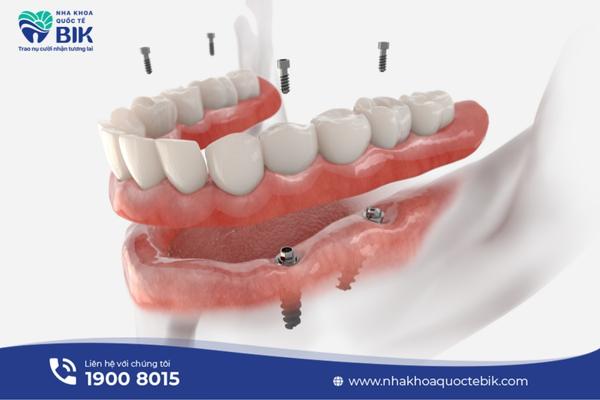
The implantation process will be carried out in a strictly sterile environment to avoid infection of the wound. First, you will be injected with anesthesia and the surgery will only take 30-60 minutes.
6.4. Attaching the Abutment and taking impressions to make porcelain teeth
After the Implant pillar has completely and stably integrated with the jawbone, the doctor will attach the Abutment joint to the pillar and the tooth impression to start making porcelain teeth.
6.5. Attaching porcelain teeth
After the porcelain teeth are made, the doctor will attach the Abutment and fix the porcelain teeth on the previously implanted Implant pillar.
6.6. Regular check-ups
You will need to have regular check-ups every 1 month or 3 months and no later than 6 months to check and clean your teeth to avoid infection.
7. How long does it take to implant an implant?
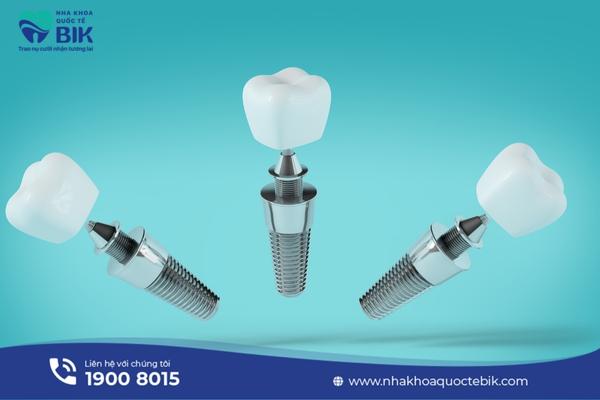
How long it takes to implant an implant depends on each person’s constitution, each oral condition and the type of implant that the customer chooses.
7.1. It only takes 1 day
Usually, for people with strong jawbones, adequate bone density, deep enough tooth sockets and the implant position does not bear much force during chewing, the implant time only takes about 1 day.
7.2. It takes 7 – 10 days
In cases where the customer has good thickness, width, adequate bone density but the implant is in a difficult position or has to bear a lot of force when chewing, the implant time will take 7-10 days.
7.3. It takes from 3 to 6 months
If the customer has lost teeth for a long time, the jaw bone volume is not enough, the tooth socket is seriously depleted, it is necessary to perform sinus lift and jaw bone grafting before starting to implant teeth. Therefore, the implant process will take longer.
8. Where should I get an implant?
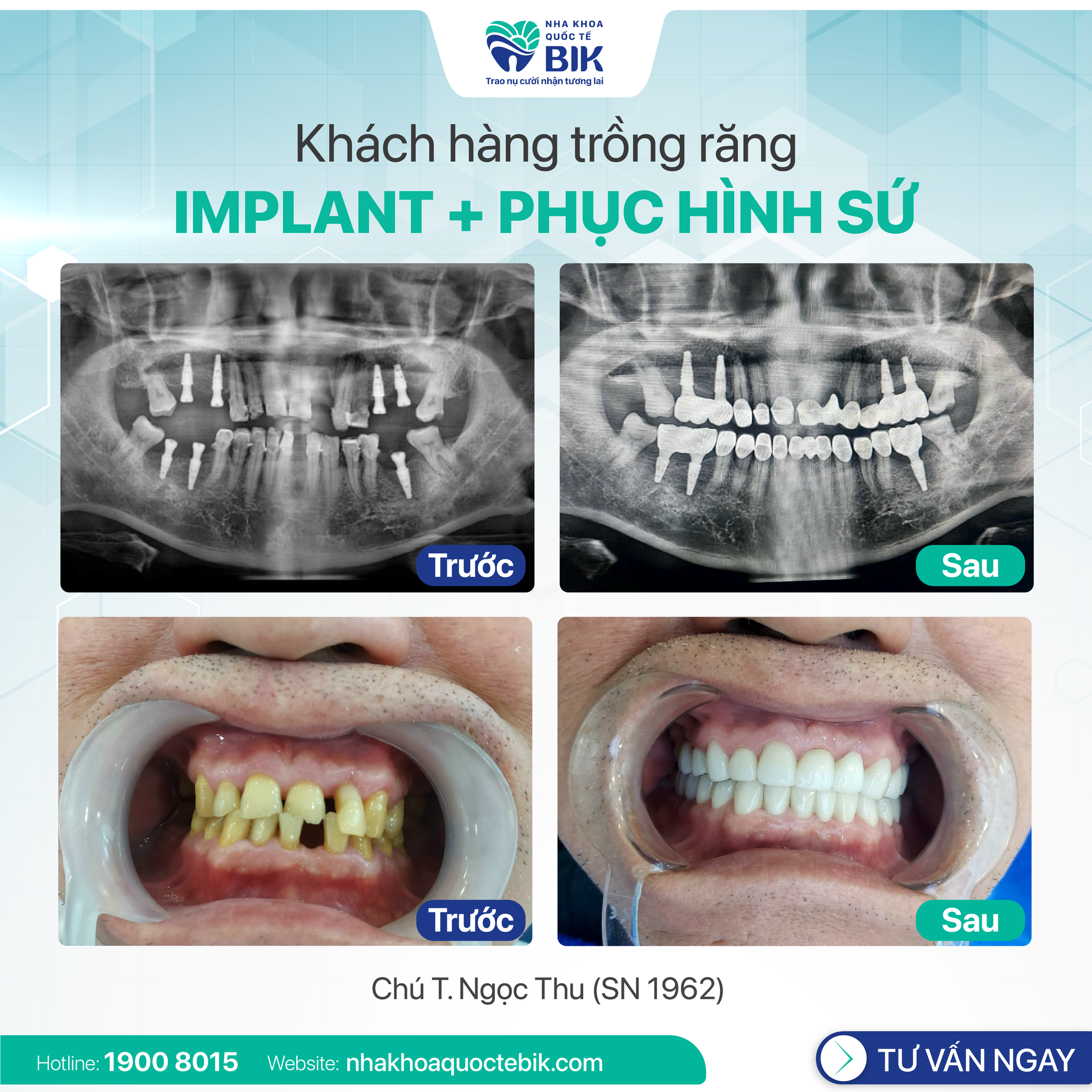
We are proud to be one of the specialized implant dentistry systems in Ho Chi Minh City and Binh Duong with the following standards:
– Modern equipment, operating rooms and sterile equipment, recognized by the Ministry of Health
– Team of doctors specializing in implant techniques: Doctors at BIK International Dental Clinic graduated from university specializing in dentistry. Regularly trained in specialized implant courses. Ensure the most suitable treatment plan for you and the surgery is safe and effective.
– Modern machinery, genuine implant pillars imported from countries such as the US, Europe, Korea, …
– Equipped with specialized implant machines, causing the least trauma.
– In particular, BIK International Dental Clinic is one of the dental clinics certified with ISO: 9001 2015 UK quality management standards.
In general, implant placement is the most optimal restoration method for tooth loss. Although it takes a lot of time and effort, in return, implant placement will bring long-term effectiveness that no other method can do.

